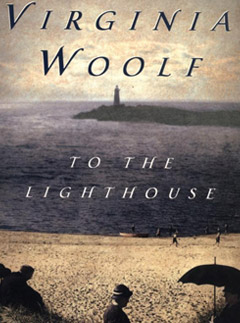The Ramsay family, along with various hangers on, is visiting their beach home in the north of Scotland. Their youngest son, James, wants to visit the lighthouse on the island off shore the next day, but his father is convinced it will rain. This is pretty much the entirety of the plot of the first half of To the Lighthouse, which peers more deeply into the psychology of individual characters than any book I've ever read. Woolf's style involves jumping from the perspective of one character to another, sometimes flitting through the minds of ten people over the course of a paragraph, sometimes settling down for fifteen or twenty pages of uninterrupted thought which turns out to have taken place in a matter of seconds. In this way Woolf illuminates the mystery of what goes on in our minds; we barely recognize, much less understand, what lies at the bottom of our psyches.
If what we think and feel is so contradictory, so prone to change, what hope is there for any kind of constancy or permanency, since everything material will pass away as well? The lighthouse, standing unmoving amid the churning waves, becomes a symbol of this hoped-for constancy. Perhaps the answer can be found in art, Mrs. Ramsay's guest Lily Briscoe thinks as she labors over her painting of the Ramsay's house:
She looked at her picture. That would have been the answer, presumably -- how 'you' and 'I' and 'she' pass and vanish; nothing stays; all changes; but not words, not paint Yet it would be hung in the attics, she thought; it would be rolled up and flung under a sofa; yet even so, even of a picture like that, it was true. One might say, even of this scrawl, not of that actual picture, perhaps, but of what it attempted, that it 'remained for ever,' she was going to say, or, for the words spoken sounded even to herself, too boastful, to hint, wordlessly; when, looking at the picture, she was surprised to find she could not see it.
Art is a stab at permanence; though Lily knows that her painting will be tossed away in the attic, there is something in the attempt that unites it the kind of permanence Mrs. Ramsay describes while handing out slices of beef for dinner:
It partook, she felt, carefully helping Mr. Bankes to a specially tender piece, of eternity; as she had already felt about something different once before that afternoon; there is a coherence in things, a stability; something, she meant, is immune from change, and shines out (she glanced at the window with its ripple of reflected lights) in the face of the flowing, the fleeting, the spectral, like a ruby...
No wonder Lily is so upset when another guest, the priggish Charles Tansley, tells her flatly that women can't paint. But Woolf has sympathy for Tansley, too, and allows the reader to dwell in his perspective for a while. If nothing else, To the Lighthouse shows that all human feeling has intrinsic value.
The narrative takes a strange turn in the middle with a long section that describes the empty and abandoned house for years--years!--with some of Woolf's most poetic, but inscrutable language. When the narrative resumes, Mr. Ramsay, Lily, and the children have returned to the house at long last, but without Mrs. Ramsay, who has died. The loss of her clearly shakes the other characters deeply, as she was beloved by all of them and served as the center of their universe. Without her, Mr. Ramsay and the children, who are now much older and don't give a rat's ass about the lighthouse, head out on the journey they never made. Does it matter that they reach the lighthouse, now that Mrs. Ramsay is gone? It's hard to say. To the Lighthouse often plays its cards close to its chest. But, as with Lily's painting, Woolf suggests that it's not the result that matters, but the attempt.


3 comments:
This sounds great. I couldn't put down Mrs. Dalloway and the style here sounds similar.
Also, Carlton read this back in 2007:
http://fiftybooksproject.blogspot.com/2007/06/to-lighthouse-by-virginia-woolf.html
Christopher Chilton: Bullshit, I don't like Virginia Woolf. - June 19, 2007
LOLOLOL
This book is much better than Mrs. Dalloway, I think.
Post a Comment